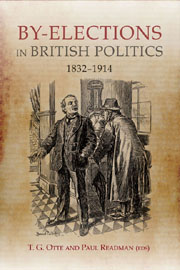Book contents
- Frontmatter
- Contents
- List of Figures and Tables
- List of Contributors
- Preface and Acknowledgements
- List of Abbreviations
- Introduction
- 1 ‘Plumping Contests’: The Impact of By-elections on English Voting Behaviour, 1790–1868
- 2 Government Appointment By-elections: 1832–86
- 3 ‘We should have had 1,000’: The By-elections of the 1874 Parliament
- 4 ‘The Glamour of Independence’: By-elections and Radicalism during the Liberal Meridian, 1869–83
- 5 ‘The Swing of the Pendulum at Home’: By-elections and Foreign Policy, 1865–1914
- 6 By-elections and the Modernisation of Party Organisation, 1867–1914
- 7 ‘A Terrific Outburst of Political Meteorology’: By-elections and the Unionist Electoral Ascendancy in Late-Victorian England
- 8 Land Reform and By-elections, 1885–1914: Do By-elections Matter?
- 9 Edwardian By-elections
- 10 Lloyd George, Limehouse and the Realignment of British Politics: The Bermondsey By-election of 1909
- 11 By-elections and the Peculiarities of Scottish Politics, 1832–1900
- Index of By-election Contests
- General Index
4 - ‘The Glamour of Independence’: By-elections and Radicalism during the Liberal Meridian, 1869–83
Published online by Cambridge University Press: 05 May 2013
- Frontmatter
- Contents
- List of Figures and Tables
- List of Contributors
- Preface and Acknowledgements
- List of Abbreviations
- Introduction
- 1 ‘Plumping Contests’: The Impact of By-elections on English Voting Behaviour, 1790–1868
- 2 Government Appointment By-elections: 1832–86
- 3 ‘We should have had 1,000’: The By-elections of the 1874 Parliament
- 4 ‘The Glamour of Independence’: By-elections and Radicalism during the Liberal Meridian, 1869–83
- 5 ‘The Swing of the Pendulum at Home’: By-elections and Foreign Policy, 1865–1914
- 6 By-elections and the Modernisation of Party Organisation, 1867–1914
- 7 ‘A Terrific Outburst of Political Meteorology’: By-elections and the Unionist Electoral Ascendancy in Late-Victorian England
- 8 Land Reform and By-elections, 1885–1914: Do By-elections Matter?
- 9 Edwardian By-elections
- 10 Lloyd George, Limehouse and the Realignment of British Politics: The Bermondsey By-election of 1909
- 11 By-elections and the Peculiarities of Scottish Politics, 1832–1900
- Index of By-election Contests
- General Index
Summary
British parliamentary by-elections have received relatively little consideration for the years before 1919. David Butler sees the preoccupation with high-profile by-elections as a product of universal enfranchisement, and the emergence of the modern two-party system. One might add that a confident, confrontational and increasingly modern media in the post-1919 years stoked the image of by-elections as a form of ‘circus’ that cast doubt on the performance of governments, dented the morale of ministries, or provided a predictor for general election results. For Butler the first recognisably modern by-elections were fought in the period 1904–5. This statement has become the conventional wisdom on the matter. Relatively few by-elections in the middle to late nineteenth century have been singled out for particular analysis. Judged in Butler's terms, before 1900, only occasional contests may be highlighted as providing genuine clues to the behaviour of the electorate in a general election. As Butler suggests, Benjamin Disraeli was unusual in the misplaced confidence he placed in the strength of the Conservative vote based on the outcomes of the Southwark and Sheffield by-elections of 1879 and 1880 which provided unreliable projections for the performance of the Tories in a general election later that year.
Nevertheless, the by-elections of the mid- to late nineteenth century should not be discounted entirely. This chapter brings together the small number of by-election contests between the general elections of 1868 and 1885 that featured an independent candidate standing outside and in defiance of the two major political parties.
- Type
- Chapter
- Information
- By-Elections in British Politics, 1832-1914 , pp. 99 - 120Publisher: Boydell & BrewerPrint publication year: 2013



